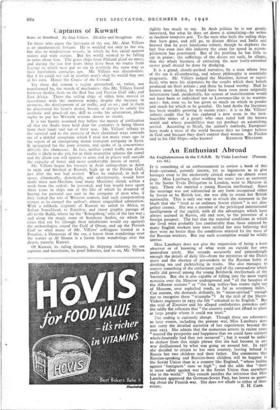An Enthusiast Abroad
IT is something of an embarrassment to review a book of this kind—personal, patently sincere, yet so ingenuous as to give hostages even to the moderately critical reader on almost every page. Miss Lansbury, after working for some years as- secretary to the Soviet Trade Delegation in London, went to Moscow in 1925. There she married a young Russian intellectual. Since the marriage was not solemnised in any form recognised either by Soviet or by British law, she was able to retain her British nationality. This is only one way in which the statement in the blurb that she " lived as an ordinary Soviet citizen " is not alto- gether correct. She was a member of the privileged international intelligentsia of the capital, with all the advantages which have always accrued in Russia, old and new, to the possessor of a foreign passport. The fact that the material conditions in which she lived were probably less comfortable than those enjoyed by many English workers may have misled her into believing that they were no better than the conditions enjoyed by the mass of the Russian workers. But any such assumption would be wildly untrue.
Miss Lansbury does not give the impression of being a keen observer or of knowing of what went on outside her own immediate circle. She records accurately and painstakingly enough the details of daily life—from the mysteries of the Dutch stove and the absence of gas-cookers to the Russian habit of drinking tea and picknicking in trains. She also manages to convey something of the enthusiasm and of the camaraderie which really did prevail among the young Bolshevik intellectuals of the 'twenties. But she is also capable of falling into the most vapid ecstasies over the Moscow underground and " all the beauties of the different stations " or " the long trolley-'bus routes right out of Moscow, over asphalted roads, as far as seventeen miles." Can anyone, she demands defiantly, be " mean-spirited " enough not to recognise these " triumphs "? At the trial of the Metro- Vickers engineers in 1933 she felt " ashamed to be English." But the trial of Zinoviev and his alleged confederates provokes only the oddly flat reflexion that " the country could not afford to allow at large people whom it could not trust."
The ending is curiously abrupt. Though there are references to later events, including the present war, Miss Lansbury does not carry the detailed narrative of her experiences beyond the year 1933. She admits that the numerous arrests in recent years " marred the prosperity and happiness that we could have enjoyed whole-heartedly had they not occurred " ; but it would be unfair
to deduce from this single phrase that she had become in any way disillusioned by what was going on around her. In 1938 she decided to return to her own country, leaving behind in Russia her two children and their father. She comments that
Russian-speaking and Russian-born children will be happier in the Soviet Union than in a country like England, " where feeling against ' foreigners ' runs so high " ; and she adds that " there is more safety against war in the Soviet Union than anywhere else in the world." This remark justifies the inference that Miss Lansbury approved the German-Soviet Pact, but leaves us guess- ing about the Finnish war. She does nor allude to either of then


























 Previous page
Previous page